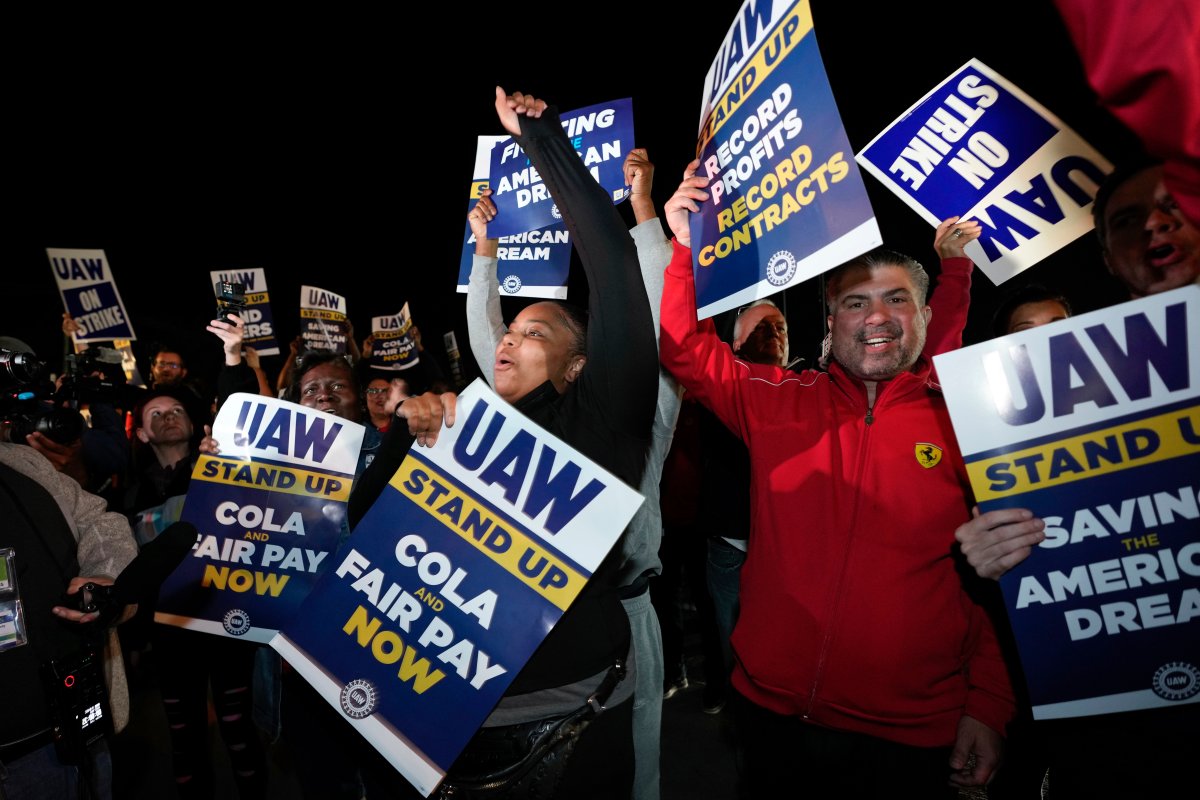The head of the union representing thousands of Canadian autoworkers says it’s “assessing” the impacts of a major auto sector strike in the United States.

About 13,000 members of the United Auto Workers (UAW) union walked off the job at all three Detroit automakers Friday — the first time the union has done so in its 88-year history. It comes after their leaders failed to bridge a significant gap in contract talks, and the current four-year deal expired at midnight.
It also comes at a time when Unifor holds contract talks in Canada with the U.S. automakers.

The Canadian union is in bargaining with Ford Motor Co. ahead of its contract expiry on Sept. 18. Unifor hopes a deal with Ford can serve as a blueprint for workers at the other automakers.
“We are in unprecedented times. The auto industry is undergoing a historic transformation with significant impacts on our jobs, our skills and the entire supply chain,” said Unifor national president Lana Payne said in an online information session for members Thursday.
“We must ensure that this transition works for us with good unionized jobs and secure work for all autoworkers in Canada.”
The U.S. strike at Ford, General Motors and Stellantis will likely chart the future of the union and of America’s homegrown auto industry at a time when the sector faces a historic transition in pivoting to making electric vehicles from building internal combustion automobiles.
The U.S. auto sector is also deeply integrated with Canada’s industry.
The automakers rely on operations and suppliers in Canada and the U.S. as components crisscross the border before they are assembled into a finished vehicle.
“We don’t know yet what the extent of that impact will be,” Payne said.
“Our team here will be assessing the situation by the hour. We will have further and regular updates.”

A source within Industry Minister François-Philippe Champagne’s office told Global News on background Friday they’re keeping a close eye on the strike.
Automotive Parts Manufacturers’ Association president Flavio Volpe told Global News last month that the U.S. strike could mean redirecting resources to avoid any major impact.
A spokesperson with Ontario’s labour ministry encouraged both sides to “resolve their differences at the bargaining table.”
“We are confident that by working together they can reach a positive resolution for the sake of autoworkers and the industry’s stability on both sides of the border,” they said.
“Our priority is the stability of the auto industry and the nearly 100,000 workers that are directly employed in Ontario’s automotive manufacturing sector.”

The UAW strike is far different from those during previous UAW negotiations.
Instead of going after one company, the union, led by its new president Shawn Fain, is striking at all three. But not all of the 146,000 UAW members at company plants are walking picket lines, at least not yet.
The UAW has targeted a handful of factories to prod company negotiators to raise their offers, which were far lower than union demands of 36 per cent wage increases over four years. GM and Ford offered 20 per cent and Stellantis, formerly Fiat Chrysler, offered 17.5 per cent.
The limited strikes will help to preserve the union’s US$825-million strike fund, which would run dry in about 11 weeks if all workers walked out. Fain has said more plants could be added if the companies don’t make better offers.
In addition to general wage increases, the union is seeking the restoration of cost-of-living pay raises, an end to varying tiers of wages for factory jobs, a 32-hour week with 40 hours of pay, the restoration of traditional defined-benefit pensions for new hires who now receive only 401(k)-style retirement plans, pension increases for retirees and other items.
Starting in 2007, workers gave up cost-of-living raises and defined benefit pensions for new hires. Wage tiers were created as the UAW tried to help the companies avoid financial trouble ahead of and during the Great Recession. Even so, only Ford avoided government-funded bankruptcy protection.

Automakers say they’re facing unprecedented demands as they develop and build new electric vehicles while at the same time making gas-powered cars, SUVs and trucks to pay the bills. They’re worried labour costs will rise so much that they’ll have to price their cars above those sold by foreign automakers with U.S. factories.
GM CEO Mary Barra told workers in a letter Thursday that the company is offering historic wage increases and new vehicle commitments at U.S. factories. GM’s offer, she wrote, “addresses what you’ve told us is most important to you, in spite of the heated rhetoric from UAW leadership.”
On CNBC Thursday, Ford CEO Jim Farley said if Ford had agreed to the union’s demands, it would have lost US$15 billion during the last decade and gone bankrupt.

It’s unclear how long the strike will persist for, but with every passing day, the pressure on both sides will grow.
Jeff Schuster, head of automotive for the Global Data research firm, said the strike could last longer than previous work stoppages, such as a 40-day strike against GM in 2019.
“This one feels like there’s a lot more at risk here on both sides,” he said.
— with files from Global News’ Sean Previl and The Associated Press
- Small grocers, co-ops receiving boost from Loblaw boycott: ‘A lot of anger’
- U.K. bans generic passwords over cybersecurity concerns. Should Canada be next?
- Overwhelmed with spam texts? Stats show the problem is getting worse
- How caregiving impacts a generation of Canadians: ‘Unpaid work does not end’






Comments